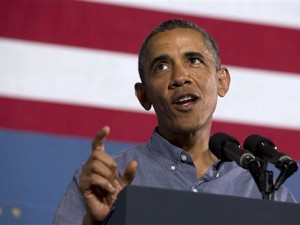Obama, Cameron weigh Syria chemical weapons response
WASHINGTON – US President Barack Obama and British Prime Minister David Cameron expressed their grave concern Saturday about the “increasing signs” of a major chemical weapons attack in Syria.
A White House statement said the two leaders vowed during a telephone call to “continue to consult closely” regarding the alleged attack near Damascus on Wednesday, as well as potential international responses.
But Downing Street went further, noting that Obama and Cameron “are both gravely concerned by… the increasing signs that this was a significant chemical weapons attack carried out by the Syrian regime against its own people.”
“The fact that President (Bashar al-)Assad has failed to cooperate with the UN suggests that the regime has something to hide,” the British statement said, stressing that “significant use of chemical weapons would merit a serious response from the international community.”
Cameron also spoke separately with Canadian Prime Minister Stephen Harper.
Another White House statement regarding Obama’s meeting with top aides in his National Security Council appeared to give credence to reports of the chemical attack on rebel-held areas near the Syrian capital.
“In coordination with international partners and mindful of the dozens of contemporaneous witness accounts and record of the symptoms of those killed, the US intelligence community continues to gather facts to ascertain what occurred,” it said.
“The president also received a detailed review of a range of potential options he had requested be prepared for the United States and the international community to respond to the use of chemical weapons.”
The meeting came a day after US Secretary of Defense Chuck Hagel said the military had presented options to Obama and was moving forces into place ahead of any possible decision.
Obama has so far voiced caution, warning that a hasty military response could have unforeseen consequences, including embroiling the United States in another prolonged Middle East conflict.
But he is under mounting pressure to act following reports of the alleged chemical weapons attack, which Doctors Without Borders said had killed 355 people, due to “neurotoxic” symptoms.
Opposition groups say the reported attack was carried out by Assad’s forces and that it killed more than 1,000 people.
